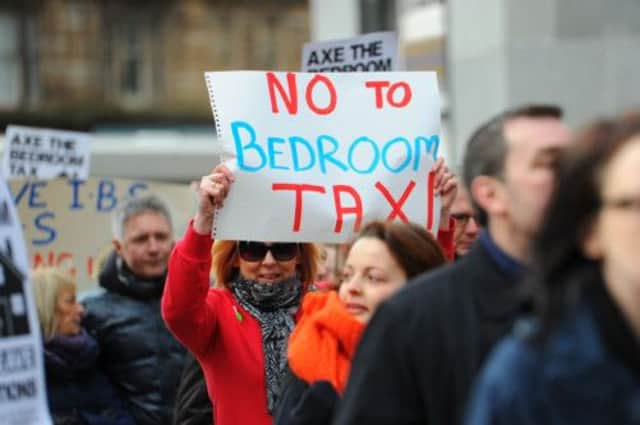Leaders: Bedroom tax review offers chance to scrap it


The review, announced by deputy prime minister Nick Clegg yesterday, does not appear to signal any ministerial admission that this most pernicious of impositions on the poor and vulnerable has no place in modern Britain.
More’s the pity. The review is, it seems, a routine piece of due diligence, undertaken by someone independent of government with the aim of giving a clear picture of the policy’s impact.
Advertisement
Hide AdAdvertisement
Hide AdIf it does its job properly, however, this review will hopefully leave ministers in absolutely no doubt of the need for the bedroom tax to be consigned to the dustbin of political bad ideas.
Seldom has a single policy come to personify the haplessness of an administration – the Tories’ introduction of the poll tax and Gordon Brown’s scrapping of the 10p tax band are two other egregious examples, but they are few and far between.
One wonders just how long David Cameron’s government is willing to be cast in the guise of Victorian era villains, as disquiet and anger about this policy continues to grow. Does he really intend to go into the next general election with it hanging, albatross-like, around his neck? If not, then he would be wise to divest himself of it at the earliest opportunity.
A sign that at least some in his government recognise the damage it is doing came with the recent briefing given to our sister paper Scotland on Sunday that there was a willingness to devolve power over housing benefit from Westminster to Holyrood in the event of a No vote in next September’s independence referendum. This was suggested with a clear understanding of the damage the bedroom tax was doing to the campaign to save the Union. It seems the same penny has not yet dropped about the damage being done to Mr Cameron’s chances of re-election in the UK general election of 2015.
The bedroom tax’s ills are well documented. Not only does it presume the government’s right to dictate the sleeping arrangements of a family’s children – surely a step too far for any politician. It also targets the very people for whom the welfare state was intended to afford the greatest protection, namely the elderly, the infirm and the disabled.
Recent victories for campaigners in tribunals and in the courts have eroded the bedroom tax’s potential to cause harm. And there is a growing determination within Scottish local government to ensure its effects are ameliorated.
But this is no substitute for scrapping it completely. And if this new review becomes the first step to ministerial acceptance of this unavoidable truth, well and good.
Increased food bank use a real concern
A fivefold increase in the number of Scots using food banks is an alarming development in the 21st century. Especially in a country that has long prided itself on a welfare state that is meant to guarantee a modicum of decency for the poor.
Advertisement
Hide AdAdvertisement
Hide AdOf course, it may well be the case that the increase identified by the Trussell Trust – which helped 23,073 people between April and September this year – is due in large part to the increased awareness about food banks, leading to greater use of them. In particular, the growing role of Citizens Advice Scotland in distributing food bank vouchers to families and individuals they identify as in need, may be a contributory factor in such a precipitous rise.
But there can be little question that the need for emergency food parcels is growing as austerity measures and welfare cuts bite deeply into household finances.
Perhaps the most sobering aspect of the Trussell Trust’s experience over the last few months has been the number of families with children looking for free food. Of that 23,073 total, 6,608 were children. It seems we live in a country where thousands of children rely on hand-outs of staples to stop them from going hungry. This is a grim statistic and it should provide the more fortunate among us with pause for thought.
For two-thirds of a century our welfare state has aimed to be a safety net to ensure a minimum standard of living for the most deprived in our society, regardless of the circumstances – illness, misfortune or fecklessness – that brought them there.
The Trussell numbers are not necessarily the sign of a crisis, but they are a sign that a crisis could soon be upon us.